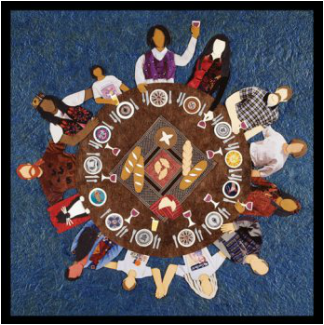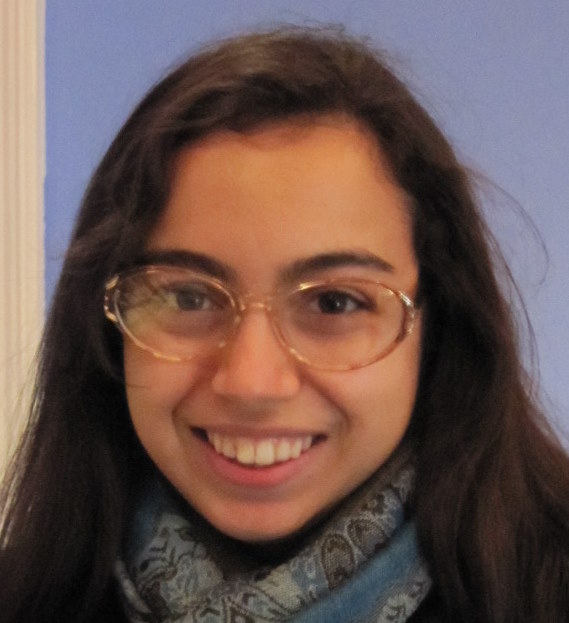 There are many models for uprooting oppression in our communities. To offer one of many, the Hosanna! People’s Seminary approach is to discern particular areas of privilege and poverty within a community through a three part process: awareness of privilege and oppression in the community; accountability in the community to the oppressed party and to the continued education and development of the privileged party through ally training; and solidarity in relationship with the oppressed party or those allying with the oppressed party outside of the community. For example, a group committed to rooting out ableism in their community and work would first grow in awareness of any ability-based disparities in privilege in the circle. To assist them in this task, they may seek out the help of an anti-oppression trainer, a trusted advisor, or a tool such as an accessibility audit. In the second stage, the group would become accountable to fighting abelism in their community by taking tangible measures such as sustained study and prayer (which would heighten awareness), making structural changes to community spaces (to improve accessibility), and changing prayer language and challenging theological assumptions (for example where disability is equated with immorality). They might also identify areas where they are currently unwilling to change and be accountable to that decision. For example, if their weekly vigil location is inaccessible, they may make a statement on their website or newsletter acknowledging that this is the case and share something about their process. This might include some of the following: an expression of awareness: We are aware that this makes our vigil inaccessible for those who use wheelchairs; a clarification of priorities in conflict: We feel that convening on the front steps of the capitol building is of high enough symbolic and strategic value to the vigil that we will continue to meet there; an expression of dissatisfaction and sadness with the present situation: We mourn the fact that this will block some friends and new members from joining…; a commitment to pursuing this issue with due diligence through other avenues: and are committed to creating opportunities where those with disabilities are able to fully participate; an expression of openness to the situation changing in the future: We are still praying on these kinds of decisions and; a request for feedback and praying-with: hope you pray with us and share your insights with us. Where change is not possible right away, this type of admission helps to break the normalizing impact of silence.1 Finally, the community will grow in solidarity around this issue outside of their work, strengthening the wider movement for the oppressed group. They may join an action alert network (to know when local legislation is threatening, say, public transportation resources for people living with disabilities), give a presentation on their process to become a more accessible, just community at a regional gathering of similar communities or organizations, or give disability activists space in their platforms (for example, allowing a disabled veterans group to speak at their anti-war vigil). Of course, most communities will find themselves in a few of these stages at once, circling continually in an unending process of becoming. Moreover, if we are indeed living decentered, multi-centered lives across and in between multiple borders, the process of undoing oppression in our communities will be a decentered, multi-centered process. As such, we gather at the roundtable in turns as representatives of the ruling class and the underdogs. Even as we keep our seats, the seat of true and false power shifts easily with the sudden interjection of a new idea--but what about us people of color in this conversation? What about us women? What about us poor people? And whatever the language of “allies” and “the oppressed,” those poor souls with the most privilege at the table may need the most attentive care. Jesus warned after all that the rich man would have the greatest difficulty entering the Kin-dom.2 To prepare for such work, several tools and attitudes might be cultivated. Most practically, in addition to choosing one or two anti-oppression/ally training modalities, there must be some framework or community agreement which lays out basic truth claims of the circle, aims and means, and processes for conflict transformation. Important to this framework is a commitment to approaching anti-oppression/liberation work not as fight against any particular people but rather always as a fight against the powers and principalities which bind everyone to the evil of oppression in all its forms. In this light those most intimately impacted by an issue at hand, their supportive friends, as well as those who have not come to understand the value of addressing the issue are all held in love and concern by those doing anti-oppression/liberation work in the circle, even where some people are detrimental to the process. Equally important to this is making sacred space for those who do believe in the importance of the work to build roundtable ministries to express their feelings, tell their stories, craft their messages, gain tools and resources, and build networks of support. When we find our gifts turned away at the primary tables of our communities, churches, jobs, or neighborhoods—when we are turned away hungry from those tables—we need to find places to feed one another and be fed. This ensures that those who are ready to feast together may do so undeterred by organizational dynamics of denial and delay. I have witnessed the value of these safe and challenging spaces in my work. Last year I was a part of an interracial young women’s theological space where most of the participants were members of white dominant organizations or working in fields where anti-racism work may be viewed as distracting or divisive. These women were able to build a roundtable mission of mutual solidarity against racism, sexism, and homophobia, learning to articulate the stories of their own sacred hunger (and sacrilegious glut) without being told they were distracting from more important issues or divisive to the community. From this base of new friendship and support, some were able to address oppression in their communities and some were simply better able to cope with the oppression they experienced because of the moral and spiritual support of their secondary group. After a community has earnestly prayed in gratitude for the grace that will transform them and taken practical steps toward building a roundtable mission of mutual solidarity by engaging in anti-oppression/liberation modalities and other tools, and forming communities of support, the community is ready for step three. Start again. The unfinalizable3 work of theological praxis for radical community building is just that: unfinalizable. If a community perseveres in prayer as they begin to uproot one injustice, their vision will expand just enough to reveal the incompleteness of their efforts. To start again, and again, and again, a community must grow in humility and humor, and build sustaining friendships with those outside of the community who can offer encouragement, guidance, and fresh inspiration. Most importantly, those of us doing this work must not do it in the hopes of building perfect roundtable missions. We work with the ingredients (ideas, prayers, resources, and so on) we have acquired by gift or harvest at any one given time. We cook and eat with whoever comes to the table. We cannot go “shopping” for the Spirit nor can we fix the menu at her table. Let us therefore cook and feed and be fed by one another simply for the joy of making room for one more, and one more again, all around the roundtable. Notes:
|
Disclaimer
The viewpoints expressed in each reader-submitted article are the authors own, and not an “official Jesus Radicals” position. For more on our editorial policies, visit our submissions page. If you want to contact an author or you have questions, suggestions, or concerns, please contact us. CategoriesAll Accountability Advent Anarchism Animal Liberation Anthropocentrism Appropriation Biblical Exegesis Book Reviews Bread Capitalism Catholic Worker Christmas Civilization Community Complicity Confessing Cultural Hegemony Decolonization Direct Action Easter Economics Feminism Heteropatriarchy Immigration Imperialism Intersectionality Jesus Justice Lent Liberation Theology Love Mutual Liberation Nation-state Nonviolence Occupy Othering Pacifisim Peace Pedagogies Of Liberation Police Privilege Property Queer Racism Resistance Resurrection Sexuality Solidarity Speciesism Spiritual Practices Technology Temptation Veganism Violence War What We're Reading On . . . White Supremacy Zionism ContributorsNekeisha Alayna Alexis
Amaryah Armstrong Autumn Brown HH Brownsmith Jarrod Cochran Chelsea Collonge Keith Hebden Ric Hudgens Liza Minno Bloom Jocelyn Perry Eda Ruhiye Uca Joanna Shenk Nichola Torbett Mark VanSteenwyk Gregory Williams Archives
October 2017
|
Search by typing & pressing enter


 RSS Feed
RSS Feed